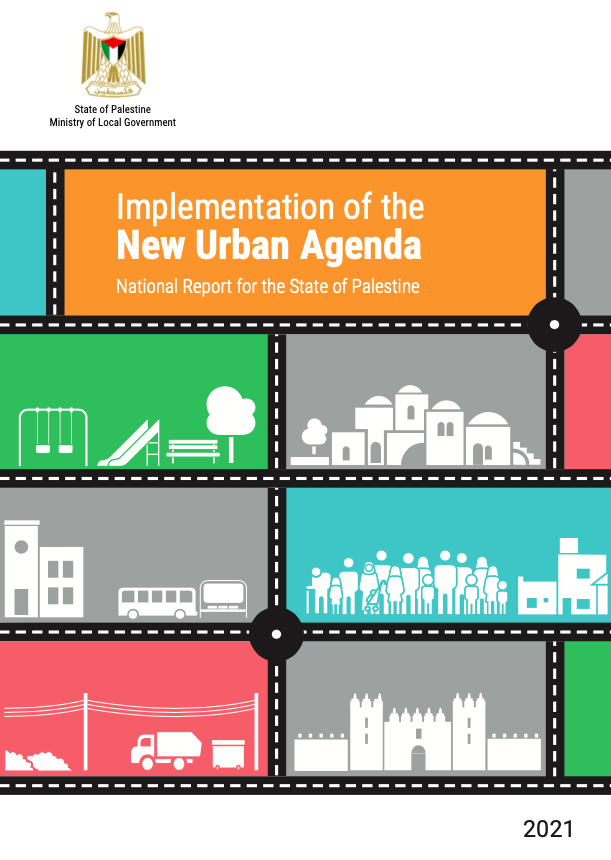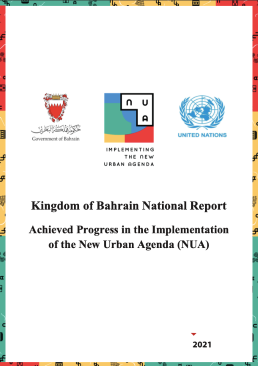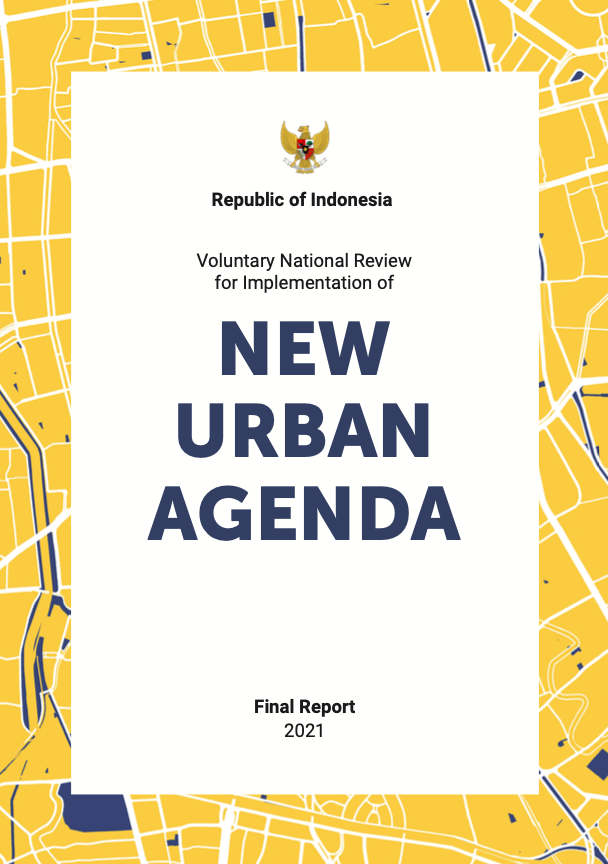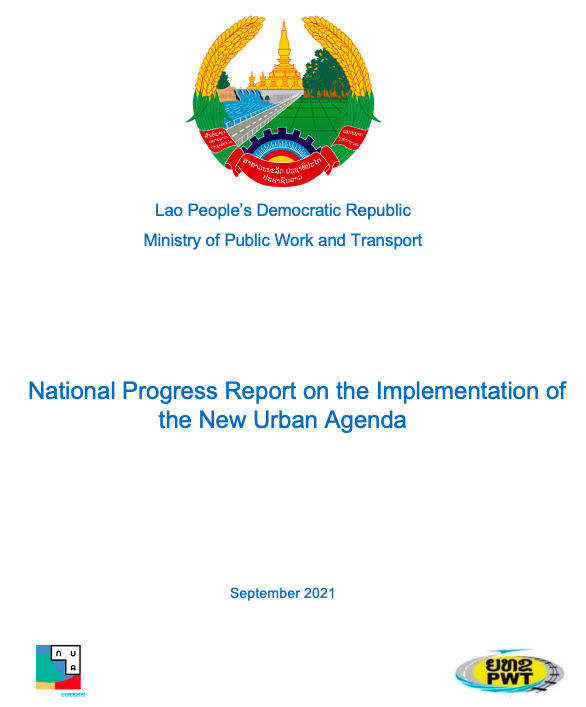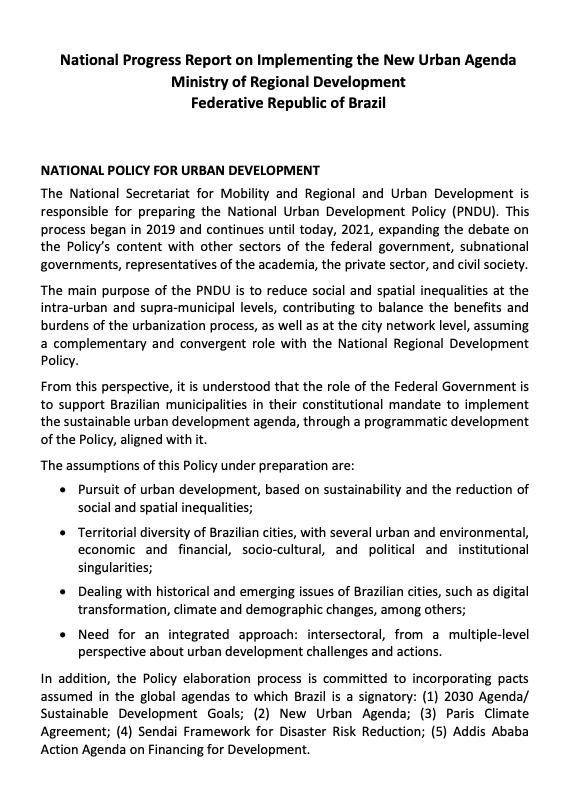Progress Report 2021
In 2015, the State of Palestine (non-Member Observer State) committed to the attainment of the Agenda for Sustainable Development by the year 2030 – a blueprint for achieving sustainable development through working towards the attainment of 17 Sustainable Development Goals (SDGs) as an urgent call for action that recognizes that the ending of poverty and other deprivations must go hand-in-hand with strategies that improve health and education, reduce inequality, and spur economic growth – all while tackling climate change and working to preserve the environment. The purpose of this report is to track progress towards Palestine’s implementation of the New Urban Agenda (NUA). The report covers the period from 2016 until June 2021, changing variably depending on the available data for each target and/or indicator. It also captures the impact of COVID-19 on the attainment of the NUA. The report aims to act as a tool for the public, policymakers, as well as development actors involved in the urban, development sector to share a common knowledge base and set a common agenda towards the advancement of the NUA in order to support the transformation into safer and more inclusive cities in Palestine.
National Report 2021
Over the past decades, sustainable urban development matters have been the focus of the Kingdom of Bahrain, as these challenges formed a fertile ground for research and discussion at various levels of decision-making bodies, which resulted in many national initiatives in planning for housing, infrastructure, open spaces, transport and communication, energy consumption, and waste recycling. Not to mention that Bahrain has a rich experience in dealing with the spatial variable by organising places through urban planning and urban development, in line with its international commitments to the Sustainable Development Goals (SDGs) 2030, Paris Agreement to tackle climate change, Sendai Framework for risk and disaster reduction, and the New Urban Agenda. These commitments formed the reference for the Kingdom’s orientations towards urban prosperity, social inclusion, sustainability, and resilience.
National Report 2021
The implementation of the New Urban Agenda in Indonesia has been initiated by various entities concerned with the current state of urban development, not only the government but also community organizations, professional associations and research organizations. At the policy dimensions, the government of the Republic of Indonesia incorporates the implementation of the New Urban Agenda (NUA), as part of SDGs, throughout the national development agenda. With the enactment of Presidential Decree No 59 the Year 2017 about Implementation Achievement of Sustainable Development Goals, NUA is framed into national action plans and policies. Its implementation is monitored and reported. It also recognizes the roles of the national level of government as well as the local level. This is a massive and collaborative endeavour between government and non-state actors designed to serve 264 million people. The Explanation of Law no. 1 the year 2011 on Housing and Human Settlement states the active participation of Indonesia in the international community, including activities of the United Nations Center for Human Settlements (UN-Habitat).
National Report 2021
The New Urban Agenda (NUA) requests that member states carry out follow-up and review actions in a periodic manner in order to track progress, assess the impact and ensure its effective and timely implementation, and warrant accountability and transparency to citizens. It also emphasises that the follow-up and review should be executed in a continual process, taking into account the contributions of government at all levels as well as the contributions of the United Nations system, regional and sub-regional organisations and stakeholders to create and reinforce partnership, exchange urban solutions and mutual learning. Accordingly, this National Progress Report (NPR) has been prepared as the first of its kind for Lao PDR with the joint effort of the Ministry of Public Works and Transport (MPWT) and UN-Habitat. The Lao NPR is structured in accordance with the Guidelines for Reporting on the Implementation of the New Urban Agenda. The paper consists of three parts. Part 1 addresses: 1) sustainable urban development for social inclusion and ending poverty; 2) sustainable and inclusive urban prosperity and opportunity for all; 3) environmentally sustainable and resilient urban development. Part 2 describes 1) building the urban government structure and the establishment of a supportive framework; 2) planning and managing urban spatial development, and 3) means of implementation. Part 3 focuses on the follow-up and review of the NUA.
National Report 2021
The National Secretariat for Mobility and Regional and Urban Development is responsible for preparing Brazil's National Urban Development Policy (PNDU) that aims to reduce social and spatial inequalities at intra-municipal and city network levels. The PNDU considers topics such as climate change, social equity, and urban security and will be implemented through a Program for Sustainable Urban Development. The Brazilian Charter for Smart Cities is linked to the PNDU and aims to promote sustainable urban development standards.
The General Coordination Office for Support to Regional and Urban Management of the Ministry of Regional Development works with pilot cities to support sustainable urban development and management strategies. This is done through the Andus project that supports the implementation of sustainable urban development and management strategies by federal, state, and local actors. The initiative aims to disseminate information and knowledge relevant to more sustainable urban development processes aligned with the PNDU and the Brazilian Charter for Smart Cities.
Furthermore, a strategy for sustainable urban development education and a guide for preparation and revision of master plans have been implemented to offer technical support to cities in their territorial planning and management processes. The strategy aims to disseminate information and knowledge relevant to more sustainable urban development processes aligned with the PNDU and the Brazilian Charter for Smart Cities.
In addition, the Casa Verde e Amarela Program has been launched to improve access to proper housing and reduce inequalities. The program aims to promote the right to housing of families residing in urban areas with a monthly income of up to seven thousand Reais (BRL 7,000) and of families residing in rural areas with an annual income of up to eighty thousand Reais (BRL 84,000). The New Sanitation Legal Framework has been established to achieve the universalization of sanitation services, with the goal of supplying water to 99 percent of the population and providing sanitary sewer service to 90 percent.
Pagination
- Previous page
- Page 30
- Next page
